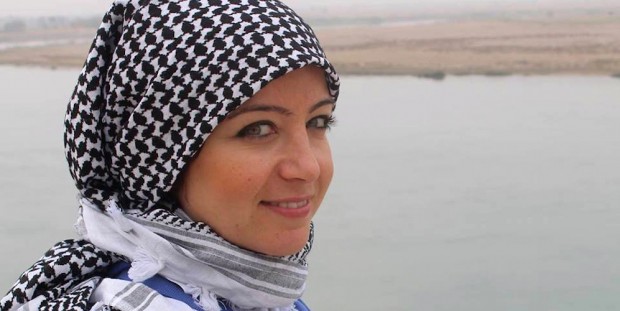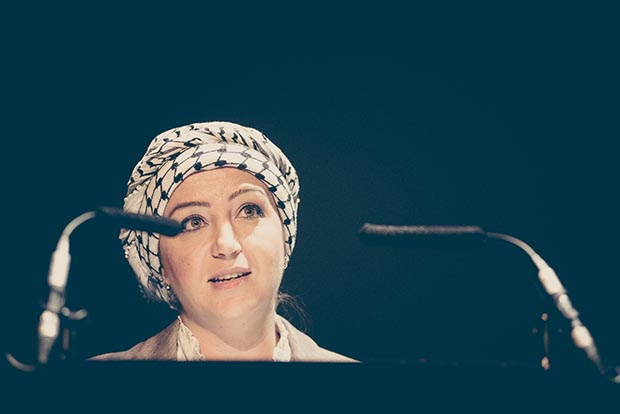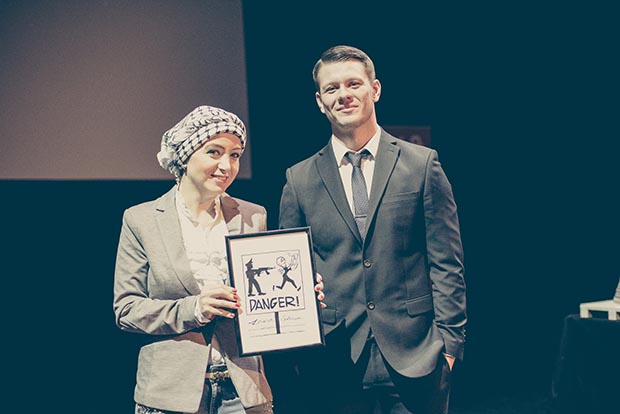Index relies entirely on the support of donors and readers to do its work.
Help us keep amplifying censored voices today.
[vc_row][vc_column][vc_custom_heading text=”Index on Censorship has dedicated its milestone 250th issue to exploring the increasing threats to reporters worldwide. Its special report, Truth in Danger, Danger in Truth: Journalists Under Fire and Under Pressure, is out now.”][vc_row_inner][vc_column_inner width=”1/2″][vc_column_text]
[/vc_column_text][/vc_column_inner][vc_column_inner width=”1/2″][vc_single_image image=”76283″ img_size=”full”][/vc_column_inner][/vc_row_inner][vc_column_text]
[/vc_column_text][/vc_column][/vc_row][vc_row][vc_column][vc_custom_heading text=”SPECIAL REPORT: DANGER IN TRUTH, TRUTH IN DANGER” css=”.vc_custom_1483444455583{margin-right: 0px !important;margin-left: 0px !important;border-bottom-width: 1px !important;padding-top: 15px !important;padding-bottom: 15px !important;border-bottom-color: #455560 !important;border-bottom-style: solid !important;}”][vc_column_text]
[/vc_column_text][/vc_column][/vc_row][vc_row][vc_column][vc_custom_heading text=”IN FOCUS” css=”.vc_custom_1481731813613{margin-right: 0px !important;margin-left: 0px !important;border-bottom-width: 1px !important;padding-top: 15px !important;padding-bottom: 15px !important;border-bottom-color: #455560 !important;border-bottom-style: solid !important;}”][vc_column_text]
[/vc_column_text][/vc_column][/vc_row][vc_row][vc_column][vc_custom_heading text=”CULTURE” css=”.vc_custom_1481731777861{margin-right: 0px !important;margin-left: 0px !important;border-bottom-width: 1px !important;padding-top: 15px !important;padding-bottom: 15px !important;border-bottom-color: #455560 !important;border-bottom-style: solid !important;}”][vc_column_text]
[/vc_column_text][/vc_column][/vc_row][vc_row][vc_column][vc_custom_heading text=”COLUMNS” css=”.vc_custom_1481732124093{margin-right: 0px !important;margin-left: 0px !important;border-bottom-width: 1px !important;padding-top: 15px !important;padding-bottom: 15px !important;border-bottom-color: #455560 !important;border-bottom-style: solid !important;}”][vc_column_text]
[/vc_column_text][/vc_column][/vc_row][vc_row][vc_column][vc_custom_heading text=”END NOTE” css=”.vc_custom_1481880278935{margin-right: 0px !important;margin-left: 0px !important;border-bottom-width: 1px !important;padding-top: 15px !important;padding-bottom: 15px !important;border-bottom-color: #455560 !important;border-bottom-style: solid !important;}”][vc_column_text]
[/vc_column_text][/vc_column][/vc_row][vc_row][vc_column][vc_custom_heading text=”SUBSCRIBE” css=”.vc_custom_1481736449684{margin-right: 0px !important;margin-left: 0px !important;border-bottom-width: 1px !important;padding-bottom: 15px !important;border-bottom-color: #455560 !important;border-bottom-style: solid !important;}”][vc_column_text]Index on Censorship magazine was started in 1972 and remains the only global magazine dedicated to free expression. Past contributors include Samuel Beckett, Gabriel García Marquéz, Nadine Gordimer, Arthur Miller, Salman Rushdie, Margaret Atwood, and many more.[/vc_column_text][vc_row_inner][vc_column_inner width=”1/2″][vc_single_image image=”76572″ img_size=”full”][/vc_column_inner][vc_column_inner width=”1/2″][vc_column_text]In print or online. Order a print edition here or take out a digital subscription via Exact Editions.
Copies are also available at the BFI, the Serpentine Gallery, MagCulture, (London), News from Nowhere (Liverpool), Home (Manchester), Calton Books (Glasgow) and on Amazon. Each magazine sale helps Index on Censorship continue its fight for free expression worldwide.
![]() SUBSCRIBE NOW[/vc_column_text][/vc_column_inner][/vc_row_inner][/vc_column][/vc_row]
SUBSCRIBE NOW[/vc_column_text][/vc_column_inner][/vc_row_inner][/vc_column][/vc_row]

A series of short documentaries directed by 2016 Index on Censorship Freedom of Expression Awards finalist Zaina Erhaim were screened at the Frontline Club in London last night.
Syria’s Rebellious Women was filmed by the Syrian journalist over an 18-month period to offer a rare insight into the difficulties faced by women living and working in rebel-held parts of Syria.
The films, which show a side of Syria rarely seen in the media, tell the individual stories of heroic women who continue to document war, provide medical services and deliver supplies to civilians despite disapproval from their families and the male-dominated society.
Erhaim told the audience that she decided to make the films after failing to find anything about Syrian women throughout history during her own research, and wanting to ensure the work of these women was remembered.
She said: “The main reason I made the films is because I am Syrian, and I’m a woman. I tried to do some research six years ago about Syrian women who participated in Syrian history and I couldn’t find anything.
“So I felt like we had to capture this work that the women are doing because in the future the men are going to be writing the history and these heroines are going to be forgotten.”
As a female journalist Erhaim faced many struggles when making the films, including being forbidden from filming in certain locations, just for being female; meaning she had to teach a male friend to use a camera in order to film scenes for her. Her friend was then hit by a missile after helping her.
She said: “Sometimes you need a hand and there are plenty of people willing to do that, free of charge; even if they are sacrificing their lives for you.”
Erhaim has spent the last two years training hundreds of citizen journalists, many of them women. She is also the Syria project coordinator for the Institute for War and Peace Reporting (IWPR), an international organisation that supports journalists in countries undergoing conflict, crisis, or transition, who co-presented the event with Index and the Frontline Club.
When asked if she was optimistic about Syria’s future she replied: “No, I’m not. I think I’m being realistic; I don’t see any change happening, at least for better. Not for women, not for men, not for Syrians.”

2016 Freedom of Expression Journalism Award winner Zaina Erhaim (Photo: Elina Kansikas for Index on Censorship)
While journalists and citizens fled, Syrian-native Zaina Erhaim returned to her war-ravaged country and the city of Aleppo in 2013 to ensure those remaining were not forgotten. She is now one of the few female journalists braving the twin threat of violence from both ISIS and the president, Bashar al-Assad.
I am honoured to receive this award here today. I believe this is not for Zaina as a person, but to the Syrian journalists and citizen journalists who refused to be turned into propagandists to the Assad regime, instead they chose to report the truth and the facts despite the very high price of that.
That’s why here I should be mentioning my great friends and colleagues who are greatly missed, Obaida Battal who has been kidnapped by ISIL in Aleppo for more than three years, Ossama Hassan also abducted by ISIL in Raqqa for more than 2 years. We don’t know whether they are alive or dead.
Baseel Safadi, who won this award and is still being detained in the regime’s prisons for his activism.
Hasan Azhari, who was killed by Assad forces under torture in Latakia; Basel Shehad, killed in an Assadi air strike in Homs; Wasim Al Idel, killed by a Russian strike; and sadly the list is too long to be cited. Different means of killing and killers all for one cause, and one crime: Journalism, freedom of expression, echoing the silenced voices of Syrians demanding their freedom.

2016 Freedom of Expression Journalism Award winner Zaina Erhaim and Jake Hanrahan of Vice News (Photo: Elina Kansikas for Index on Censorship)
Those are the ones who I believe deserve all the honouring awards in the world.
I want to give this award to the Syrians who are being terrorised by one of the worst tyrants, ISIL, international jihadists and strikes, and above all those trying to flee and are being treated as potential terrorists themselves, and are being discriminated against for demanding justice, peace and a respected life in a free, democratic country.
This award is for the journalists and citizen journalists still taking this dangerous, difficult path, sacrificing everything, playing hide and seek with death to get the stories of the Syrian people out. So please keep your eyes on our news, pictures and videos, because great heroes are dying to get them to you.
#IndexAwards2016 Index announces winners of 2016 Freedom of Expression Awards
Jodie Ginsberg: “Free expression needs defenders”
2016 Freedom of Expression Awards: The acceptance speeches
Bolo Bhi: “What’s important is the process, and that we keep at it”
GreatFire: “Technology has been used to censor online speech — and to circumvent this censorship”
Murad Subay: “I dedicate this award today to the unknown people who struggle to survive”
Smockey: “The people in Europe don’t know what the governments in Africa do.”

Join us for a film screening and discussion at the Frontline Club with Syrian journalist Zaina Erhaim, co-presented with Index on Censorship and IWPR.
This event will feature screenings of Zaina‘s short films from the series Syria’s Rebellious Women, as well as a Q&A with Zaina who is in London as one of the finalists in the Index on Censorship’s Freedom of Expression Awards 2016.
Living and working in Aleppo, Syria, Erhaim directed the film series Syria’s Rebellious Women over a period of 18 months to offer a rare insight into the challenges facing women living and working in rebel-held parts of Syria.
Revealing a side of Syria that is often absent from the news, the films tell the individual stories of a diverse group of strong, resilient women. As well as facing the constant threat of bombing, the women must battle the conservative traditions of a male-dominated society and tackle restrictions on their movements, dress and behaviour. Despite disapproval from their families, the women continue undeterred along the paths they have chosen – documenting war, delivering supplies to civilians, and providing medical services.
Erhaim currently lives and works in Aleppo, Syria. Over the last two years, she has trained over 100 citizen reporters from inside Syria, approximately a third of them women, in print and TV journalism. Erhaim is also the Syria project coordinator for the Institute for War and Peace Reporting (IWPR), an international organisation that support journalists in countries undergoing conflict, crisis, or transition. Many of Erhaim’s students, from all walks of life, have been published in major international news outlets.
When: Tuesday 12 April 2016, 7:00 PM
Where: The Frontline Club (map)
Tickets: Standard – £12.50, Concession – £10.00. Book here.